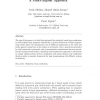641 search results - page 61 / 129 » Formal Reliability Analysis Using Theorem Proving |
110
click to vote
EUSFLAT
2001
15 years 3 months ago
2001
The aim of this paper is to build a formal model for similarity-based fuzzy unification in multi-adjoint logic programs. Specifically, a general framework of logic programming whi...
157
click to vote
ICALP
2011
Springer
14 years 5 months ago
2011
Springer
-Preserving Atomicity Abstraction Alexey Gotsman1 and Hongseok Yang2 1 IMDEA Software Institute 2 University of Oxford Modern concurrent algorithms are usually encapsulated in libr...
140
click to vote
TAP
2010
Springer
15 years 4 days ago
2010
Springer
Program verification systems based on automated theorem provers rely on user-provided axioms in order to verify domain-specific properties of code. However, formulating axioms corr...
171
Voted
CAV
1998
Springer
15 years 6 months ago
1998
Springer
As a pedagogical exercise in ACL2, we formalize and prove the correctness of a write invalidate cache scheme. In our formalization, an arbitrary number of processors, each with its...
141
click to vote
CADE
2002
Springer
16 years 2 months ago
2002
Springer
Abstract. Proof-carrying code (PCC) allows a code producer to associate to a program a machine-checkable proof of its safety. In the original approach to PCC, the safety policy inc...

